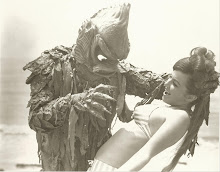We're closing in on the Top Ten (watch this space on Halloween to see which films made the cut), but in the meantime the bottom half of the Top 20 includes some of the most brutal, notorious exploitation/horror flicks to ever emerge from the mean streets of ... Connecticut. Nazi zombies, turkey monsters, killer scarecrows, and hooded killers await!
20. The Town That Dreaded Sundown (Arkansas, 1976): Although The Legend of Boggy Creek
remains Charles B. Pierce's most well-known film, this docu-drama
may be his finest. Based on the real-life Texarkana Moonlight Murders, it
boasts a higher budget and a semi-well-known cast that includes Ben Johnson,
Andrew Prine, and Dawn Wells.
19. Silent Night, Bloody Night (New York, 1974): This sometimes incomprehensible story about a mad
killer seeking vengeance against the elders of a small town as they prepare to
sell a notorious former madhouse is high on atmosphere, even if it seems a bit
thin on logic. It does have a great score (you can buy it here), a creepy
flashback of the inmates breaking out of the asylum, and John Carradine. Star
Mary Woronov was married to director Theodore Gershuny.
18. Sleepaway Camp (New York, 1983): It takes everything good about Friday the 13th,
adds some perversely cruel kill sequences, and tops it all off with one of the
most jaw-dropping endings in the history of the genre -- the final freeze-frame
image haunted me for years. The sequels have been all over the map, but the
original Sleepaway Camp still packs a unique punch.
17. Scarecrows (Florida, 1988): I often refer to this as the last of the great
independent Florida horror films. A gang of paramilitary bank robbers land in the boondocks after a turncoat member parachutes out of their highjacked
plane with the loot. Once on the ground, they find themselves at the mercy of a
pack of creepy, homicidal scarecrows. With impressive effects by then-teenage
designer Norman Cabrera.
16. I Spit on Your Grave (Connecticut, 1978): Although it's best known for its repugnant, lengthy
rape and subsequent bathtub castration scene, the sequence showing
Camille Keaton's traumatized post-attack walk home through the woods is probably
the most powerful scene in the film. I've never liked it much, and I don't
really buy the idea that it should be looked at as some kind of feminist,
anti-rape tract, but it ranks high here based on its reputation and influence.
15. Maniac (New York, 1980): Joe Spinell delivers a sweaty, unforgettable performance as an NYC
psycho carving up local ladies and pinning their scalps to his collection of
creepy mannequins. Although grim and at times repellent, Spinell (who also
co-wrote the film) puts his all into his role as Frank Zito, and Tom Savini's
memorable splatter effects secured Maniac's reputation with gorehounds.
14. Shock Waves (Florida,
1977): The 1970s witnessed the emergence
of the peculiar Nazi/zombie subgenre that included the likes of Joel M. Reed's Night
of the Zombies and Jess Franco's Oasis of the Zombies. Shock Waves, along with Zombie Lake,
formed their own sub-sub-genre of underwater Nazi/zombie movies. Shock Waves was clearly the superior of the two, thanks in part
to appearances by Peter Cushing and John Carradine, along with the imposing,
angry undead monsters.
13. Blood Freak (Florida, 1972): You may be wondering what this crazed oddity is
doing so high up on the list, but I think we can all agree that this
harebrained combination of bikers, anti-drug propaganda and blood-drinking
turkey monsters is the wildest thing to ever emerge from the decidedly freaky
Florida film scene. Leading man Steve Hawkes still occasionally makes the news
thanks to his collection of exotic pets.
12. Basket Case (New York, 1982): Frank Henenlotter's love letter to exploitation films
is as well remembered for its goofy humor as its gruesome violence. The story
of the Bradley brothers (separated Siamese twins, one normal and one a mutant)
remains one of the highlights of 1980s New York film scene, and inspired two
sequels.
11. Last House on the Left (Connecticut, 1972): Groundbreaking exploitation film that left a
permanent mark on the genre via its unabashed brutality, a stand-out
performance from the late David Hess, and a memorable ad campaign ("Keep
Repeating: It's Only a Movie!"). It also put both Sean S. Cunningham and
Wes Craven on the map, and served as a right of passage/endurance contest for
horror fans decades after its release.












SHOCK WAVES! Good call. Can't wait for the top ten.
ReplyDelete